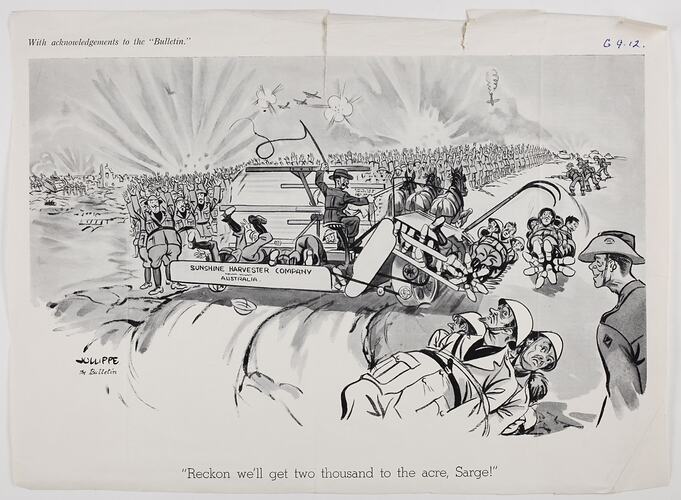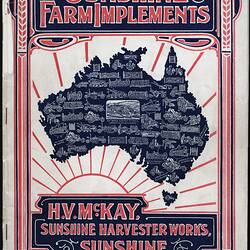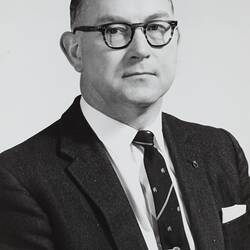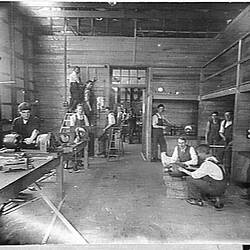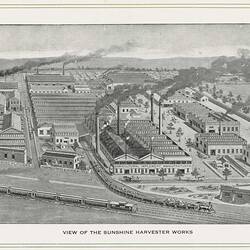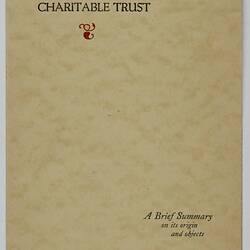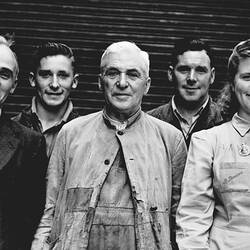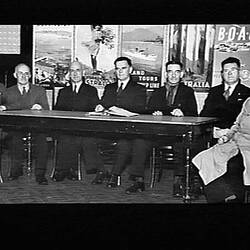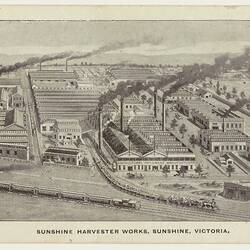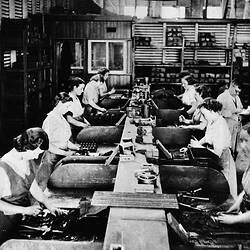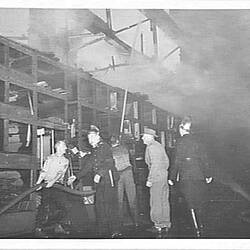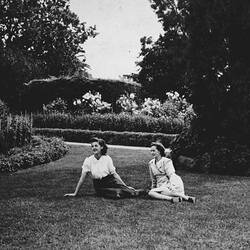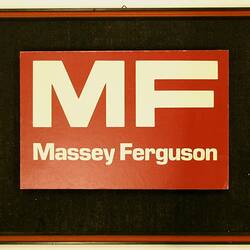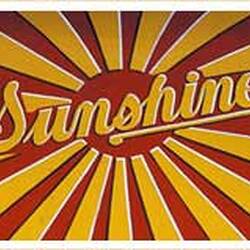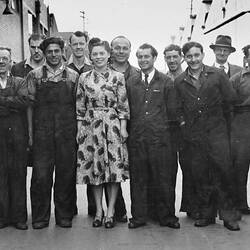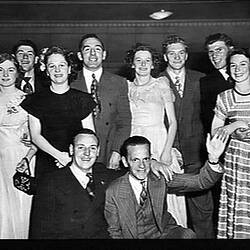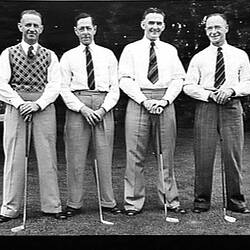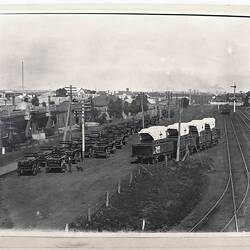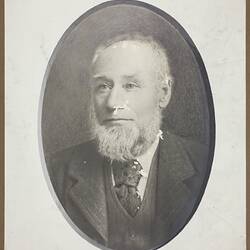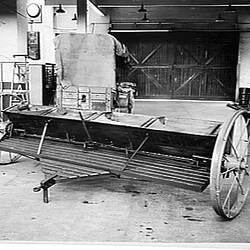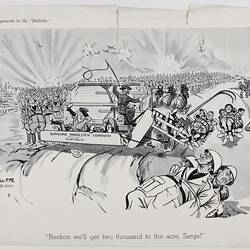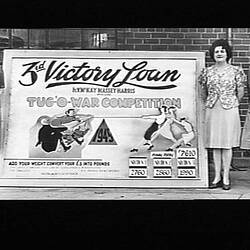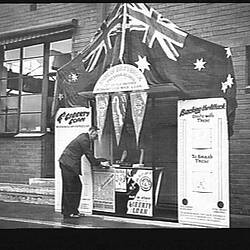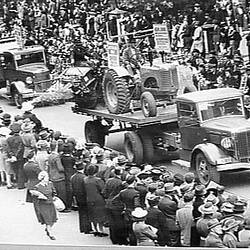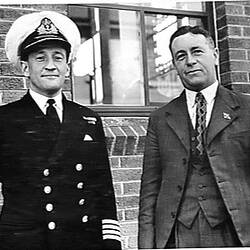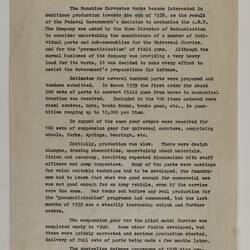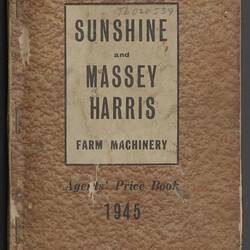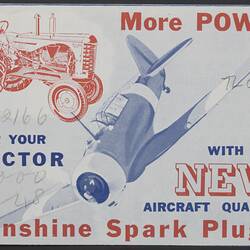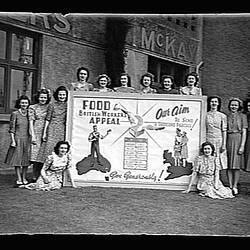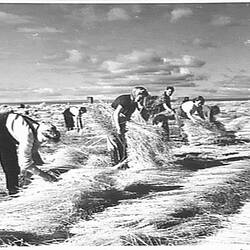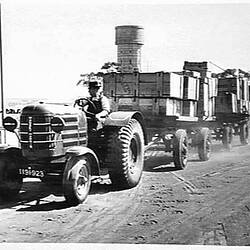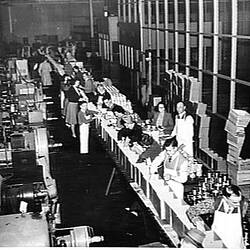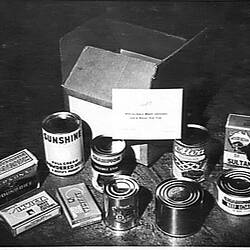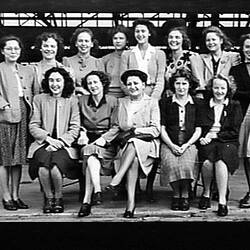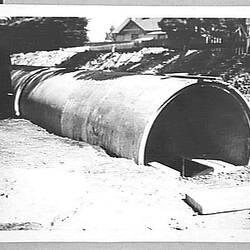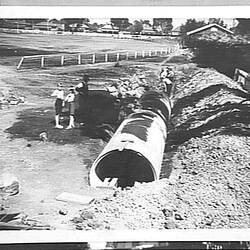Summary
Contributions made to World War II by Sunshine Harvester Works, including production of equipment for the Australian army and Great Britain, employees' military service, raising money for War Bonds and Britain's Food Appeal.
The Great Depression slowed production at the Sunshine Harvester Works as many employees were either let go or worked reduced hours. However, operations at the factory picked up during World War II as the plant focused on manufacturing equipment and weapons for the Australian military. The factory produced millions of spare parts for guns, rifles, tanks, marine and aircraft engines. Ammunitions were also produced following the government's creation of a gun munitions annexe in the factory.
As well as providing support to the Australian military, the Sunshine Harvester Works assisted the British in their war efforts. The factory produced and sent 20,000 Sunshine drills and cultivators, binders and disc harrows to Great Britain during the war. The British government also ordered 400,000 shell bodies from the company.
Although the company shifted its focus to war production, agricultural equipment continued to be made by less experienced labourers. Employees worked long, strenuous hours as the factory produced military equipment 24 hours a day. The Blacksmiths Shop alone produced an estimated total of 7,000 metal grids per day for the war.
Women also contributed to the factory's war efforts. Women filled the factory's vacant positions left by male workers who enlisted in the military. They were primarily employed in the factory's Annexe and the Bolt, Core and Binder Canvas Shops.
Many company employees enlisted in the Australian army. By January 1945, a total of 659 staff members from around Australia were enrolled in the Australian forces. Most fighters were Victorian men in the Australian Imperial Force (A.I.F) and the Royal Australian Air Force (R.A.A.F). In addition, some apprentices enlisted in the Royal Australian Navy (R.A.N). There were also a small number of women serving in the Women's Auxiliary Air Force (W.A.A.F) and the Australian Women's Army Service (A.W.A.S). The wife of Stuart McKay (H.V McKay's grandson) was an officer in the Women's Auxiliary Training League which assisted women working on Australian farms during the war. By the beginning of 1945, 32 employees died in the battle.
Some ex-servicemen returned to Sunshine Harvester Works. For instance, Jack Vance resumed work at the factory in 1946 following a six year stint in the A.I.F. He was held captive by the Japanese for 3 ½ years. In this time, he was imprisoned in Changi for three months, spent 20 months in Burma and was held in Thailand for 19 months.
Sunshine Harvester Works employees raised money for their military colleagues and for other war-related campaigns. In April 1940, the Sunshine Harvester Works Patriotic Fund was established to provide financial assistance to employees serving the military. The company's staff voluntarily donated one penny from their salary per week. This money allowed servicemen and women to purchase canteen orders and other comforts. By 1945, employees had donated £2,411/12/10 to the fund.Each year during the war, employees initiated various appeals to raise money for the Victory Loan Campaign. Female employees in particular were active in collecting money for the purchase of Victory Loan Bonds. A Tug-of-war competition was organised for the Third Victory Loan Campaign at Sunshine between employees Mrs O'Neill (who won the event), Joyce Lowe (who was runner-up) and Verna Donald (came third place). During the campaign, a total of 510 subscribers donated £7,610.
War Savings Group No. 258 was created at Sunshine in June 1940. From the time of their establishment until January 1945, the Group contributed £43,307/4/0 through employees purchasing war saving certificates. The Group was made up of different company departments with a total membership of 1,108. Money was collected on a weekly, voluntary basis which went to the purchase of certificates. Branches interstate also had their own War Savings Groups.
Employees' involvement in war assistance continued after the cessation of battles in Europe. Sunshine employees initiated the Food for Britain Appeal where foodstuffs were purchased for workers at the Butterley Company in Derby, England. This was at a time when England was facing a food shortage. Company branches around Australia also began their own appeals to assist in food relief efforts. The Butterley Company sold McKay Massey Harris machinery and spare parts in the United Kingdom. By December 1948, a total of 2,058 food parcels were sent to England which was enough to provide each Butterley employee with a package. Variety concerts were also organised in Footscray to raise funds for the appeal.
- References
- Sunshine Review 1945, 'Sunshine's Record of War Savings Certificates Purchased', 'Roll of Honour' and 'Salute to the Services', vol.2, no.2, pp.2, 4, 8.
- Sunshine Review 1945, Untitled, 'Employees Patriotic Fund' and 'Roll of Honour', vol.2, no.3, pp.3, 8.
- Sunshine Review 1945, 'Food for Britain Appeal', vol.2, no.5, pp.3.
- Sunshine Review 1946, 'Total of Sunshine Employees' Contributions to War Loans, War Savings Certificates and Patriotic Fund', vol.3, no.6, pp.2.
- Sunshine Review 1946, 'A Pat on the Back', vol.3, no.8, pp.4.
- Sunshine Review 1948, '2nd Food for British Workers Appeal Given Popular Support', vol.1, no.1, pp.12.
- Sunshine Review 1948, '2nd Food for British Workers Appeal Concluded', vol.5, no.3, pp.8.
- 'Training Women to Work Farm Machinery', 1940, The Argus March 14, p.10.
- Faulkner, R (ed). 1986 (?), Duty Nobly Done: Sunshine Harvester Diary, 1987. Melbourne's Living Museum of the West, Footscray, Vic.
- Ford, O Vines, G in association with Graeme Butler and Francine Gilfedder 2000, Brimbank City Council Post-contact Heritage Study: Environmental History, Volume 1. Brimbank City Council, viewed 28 June 2013, <http://www.brimbank.vic.gov.au/Development/Strategic_Planning/Our_Heritage>
More Information
-
Keywords
-
Authors
-
Article types
